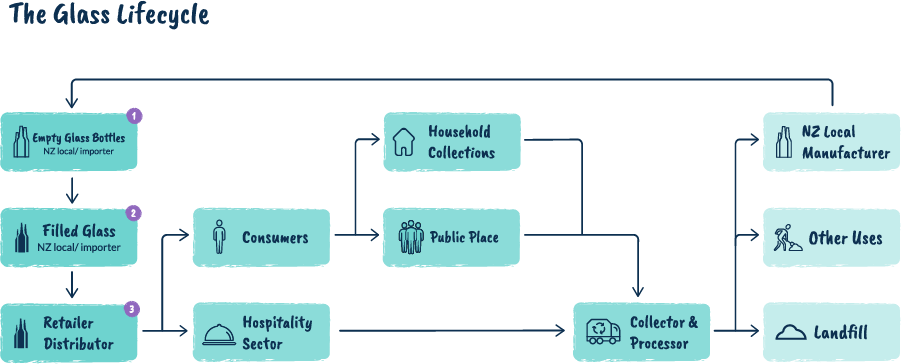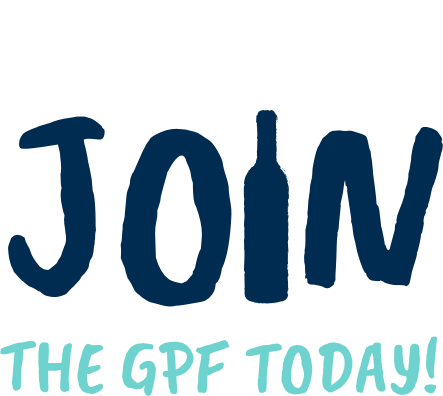
GPF Product Stewardship Scheme
How it worksThis voluntary product stewardship scheme aims to ensure that as much container glass as possible is diverted from landfill to benefit New Zealand’s community and the environment.
It was the first packaging scheme and the second product stewardship scheme for any product or industry to be accredited under the Waste Minimisation Act 2008. The scheme has now been reaccredited until 2024.
What glass is included?
The scope of the scheme currently covers over 75% of container glass on the market in New Zealand, primarily for food and beverages.
It includes New Zealand’s only manufacturer of glass bottles and jars as well as those manufacturing, distributing and selling products in glass containers. Companies using a significant volume of glass packaging are encouraged to become members of the GPF.
What’s not included?
Glass that is not a bottle or jar is not included.
For example, light bulbs, fluorescent tubes, pyrex dishes, glass ovenware, china and crockery, window glass, laboratory glass containers, TV tubes and computer screens, etc.
Funded by members
The scheme is funded by voluntary levies from companies that make or import glass containers, fill or sell glass containers in New Zealand.
These levies are used to fund projects, research, infrastructure and educational programmes to increase the recycling and re-use of glass into either new glass containers or for alternative uses that lead to a reduction in waste container glass to landfill.
Product Stewardship Scheme
Who is involved?

What is product stewardship?
Product stewardship moves responsibility for waste to those involved in the production and supply of the product (and its packaging). It involves those who know the most about the product – the businesses who make and sell it – in designing the solution.
Legislative Framework
The Waste Minimisation Act 2008 provides a regulatory framework for the establishment of product stewardship for key products. Most product stewardship schemes will be voluntary but mandatory schemes could be required where there is “significant advantage in having a product stewardship scheme, but this is either unlikely to be developed, or an existing voluntary scheme is not effective” (Waste Minimisation in New Zealand: A discussion document from the Ministry for the Environment).
Constitution
Members of the Forum have all signed written declarations confirming their commitment to the Glass Packaging Forum Constitution and automatically become members of the scheme.
Representatives from local government, recyclers and community groups are part of an expert advisory group to the Forum’s steering group to ensure that decisions with regard to funding and direction are also influenced by those collecting and recycling glass.
Funding
This levy is imposed on:
- Producers of glass and importers of glass – both empty and filled
- Glass fillers in New Zealand
- Retailers of products in glass packaging
The levy is applied at each stage of the packaging cycle i.e. (1) manufacture (2) filling and (3) sales. Each participating company pays a levy based on the weight of glass which they use in product or sell to customers. The levy is used to fund objectives which deliver and improve glass recovery.
Duration of the scheme
Under the legislation the maximum duration for a scheme is seven years. The scheme was first accredited in 2010 and reaccredited in 2017.
Scheme objectives
The scheme covers:
- The design and specification of glass packaging to minimise use of resources.
- Funding to increase the recovery of glass containers and improve the glass recycling rate by diverting waste container glass from landfill for use in the manufacture of new glass containers or for alternate use
- Consumer awareness and education programmes
- Work to reduce the carbon footprint of glass packaging
- Research into improving the collection of glass and finding alternative uses and specifications for the recovered materials
- A fundamental requirement of any scheme is that it can only include objectives over which it has direct control
Scheme Manager
3R Group Ltd are the current scheme managers and are responsible for:
- Working with stakeholders to improve outcomes for glass
- Reporting annually on the performance of the scheme and compliance to it
- Reporting recovery and recycling rates; conducting consumer and education awareness programmes; and improving communications with local government and community groups.
- Collating data from members and other stakeholders to demonstrate progress towards reducing the amount of glass waste to landfill as well as optimising recycling options.
- Other operational aspects.
Become a Member



